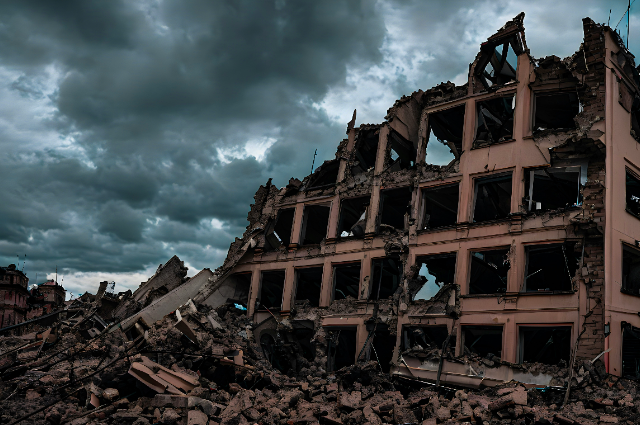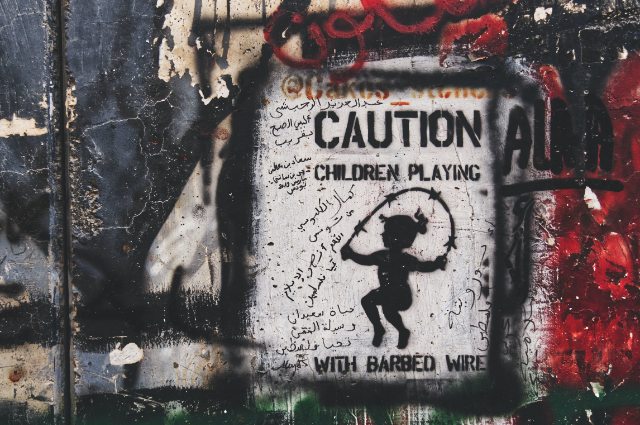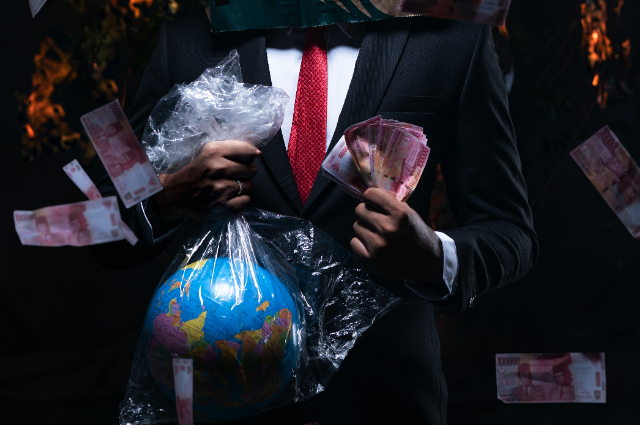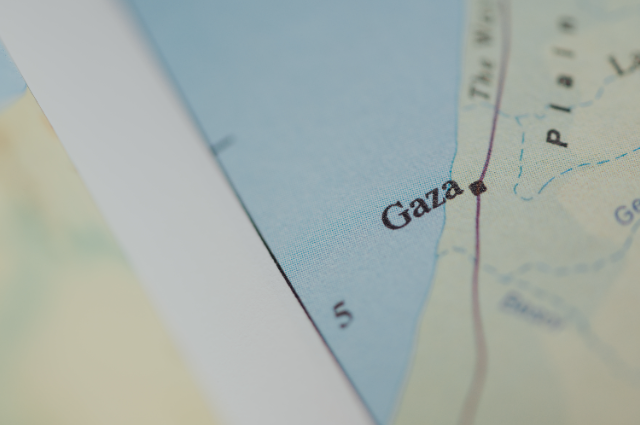
Photo by Jade Koroliuk on Unsplash
As the world descends into endless bouts of chaos and bloodshed, “humanity” whatever that word means at this juncture, is dying a slow groaning death. Anchored to the Eurocentric/Capitalistic understanding of the world the term has shape-shifted paradigmatically to accommodate war as somehow humanitarian. I understand that defending oneself or the integrity and the sovereignty of a nation-state is a fundamental right and duty of the individual/state. But initiating a mechanism that sacrifices indiscriminately, and claims victimhood on the other hand, is a classic tactic that the early 19th-20th Century world is quite familiar with. Kipling called it the “Whiteman’s Burden” and ironically this burden has been dislodged and unloaded onto the Colonized states now. This “you deal with it now, since it's your issue” attitude is quite problematic since the colonized never really had the agency to manufacture these problems. Consequently, they are often left at a stalemate, insofar as coming up with a potential solution is concerned.
How do you climb out of poverty if you don’t know where to get the money from? Where do you go if the land that you have called home for centuries is suddenly snatched away from you? How do you overcome generational trauma and hatred because a lawyer from Britain drew an unmethodical line and split your identity?
These are some of the questions that have plagued the collective consciousness of the subcontinent and the Middle East for over seven decades now. Now some people might argue that inequality is an unwanted but fundamental element of society. That it has existed for as long as humans have walked the surface of the earth, and has cropped up across civilizations is absolutely true. But institutional inequality, where we find whole political mechanisms and media outlets trying to whitewash a holocaust scale event behind the veil of “a nation protecting its national boundaries,” when it is clearly not the case, is extremely concerning.
Most of these problems have a colonial background. The colonizers in their profound wisdom, created problems. I suppose they wanted to leave something for their colonies to remember them by. With some minor reservations, I must declare that they have been quite successful in their endeavor. Colonialism’s long shadow has followed the East well into the first quarter of the 21st Century. The Balfour Declaration and the drawing of the Radcliff Line are only some of the events in a gross sequence of unplanned implementation that have been responsible for the inexorable socio-political turmoil that Asia has witnessed in the last one hundred years or so. What is happening in Gaza now, and what has been happening on the Eastern border of Ukraine since February 2022, has received disproportionate media attention. Why is that? How does media, borrowing Chomsky’s term “Manufacture Consent,” and does so in diametrically opposite ways? War is not war, at least not how the media outlets like “CNN” or “BBC” and “Al Jazeera” see it (I am using these names, because they represent antithetical points of view in relation to each other). There is always a white/brown/black migrant idea attached to it. There are always selective biases in their reporting, and there is always a good/bad narrative at play.
There is a war of ideas happening in the media realm, a verbal jostling of sorts, to influence the minds of the viewers, to manufacture consent for the grossness on display, all the while turning the war into some sort of gimmick for the viewers to enjoy with CGI graphics where we observe enthusiastic anchors stepping into their virtual army tanks to explain to nonchalant viewers how the war is being fought. It is almost as if, as Jean Baudrillard writes, “the [Gulf] War did not happen,” neither did the Gaza or the Ukraine Crisis. The nonchalant viewer at the end of the report having witnessed CGI-generated Tanks fire missiles into the sky, destroying “terrorist” barracks with pinpoint precision, with no casualties, no maimed or headless bodies, changes the channel having seen the same images multiple times in action films. This numbing of the senses, regarding the humanitarian crisis, like Gaza which is ‘the world’s largest open-air prison,’ reeks unmistakably of sustained information manipulation.
The disparate media attention to the crisis in the Middle East is also an important case study in understanding how the anesthesia of apathy is injected into the masses and they are made to believe that some lives matter more than others. The creation of the Lesser human, a symbolic apartheid form of segregation that a lot of media houses are practicing, and the virtual witch-hunt that is happening across the world for people raising their concerns regarding the war crimes of Israel, is concerning. The borders are shrinking, not just the physical ones like the LOC (Between India and Pakistan), the DMZ (Between South and North Korea), or the Gaza Strip but the borders that determine the line of what’s acceptable for people to say as well. We as a society are increasingly receding into a cocoon of orthodoxy and it feels imminent with every ensuing conversation, that is even mildly critical of the dominant view, that violence or jail time is around the corner. The media which is supposed to be the fourth pillar of democracy, whose primary task is documenting the events in an unbiased manner, of becoming the voice of the needy, where is that one might ask? That is a question better left for history to chronicle and posterity to decide. But from where I Stand they are too busy trying to find out whether “Seema was a spy from Pakistan or not?”
The Lesser Human:

Photo by Jakob Rubner on Unsplash
Mohammad Mousa in an article for Al Jazeera writes “Growing Up in Gaza is inspiring for anyone, but especially for poets--- life here is poetry blown to pieces and scattered all over the place.” I will not be going into the history of Gaza, or the Israel-Palestine conflict, because that is not the purpose of the article. We have spent so much time trying to find out who’s right or wrong, that we forgot to count the bodies of the children who could have had a future, Of parents who could have seen their children blossom into beautiful human beings. Instead, they are forced to watch them as Mousa puts it, “blown to pieces.” And even then, at the sight of utter dismay, when we witness people forcing their geopolitics where empathy is required, it makes me question what has given rise to this monstrosity of being right, of forcing correctness in the face of a family who has just lost their everything. The internet which was supposed to act as a bridge connecting people over virtual platforms has been weaponized into a tool for propaganda, and the tidal forces of maligned/manufactured information that is washing over viewers of television every minute of the day is functioning to create an army of people whose only purpose is to hate. The media, as the colonizers in the past, are largely responsible for the creation of the Lesser human.
The Lesser human reduced to its barest semantic definition is a subordinated category beneath what is commonly considered human. For instance, the right to life and liberty is something that is usually taken for granted when we talk about human beings across the geo-political spectrum. Nationality is not usually a deciding factor when it comes to defining these basic civil and political rights, at least in democratic political spaces. But with careful manipulation of information and a bit of what is known as epistemic violence, these basic rights can be transfigured into exclusive rights. The refugees or the migrants are considered lesser humans and consequently don’t enjoy these rights. Some are destined to be held in abeyance forever at the borderlands quite like Saadat Hasan Manto’s Toba Tek Singh.
Manto writes, “There, behind barbed wire, on one side, lay India and behind more barbed wire, on the other side, lay Pakistan. In between, on a bit of earth which had no name, lay Toba Tek Singh.” This rings true for a lot of Ukrainian migrants who are stranded on the Eastern borders of Finland. They have been denied entry because of a sudden increase in the arrival of refugees which Helsinki says has been orchestrated by Moscow (See DW’s Documentary).

Photo by fikry anshor on Unsplash
While this news is extremely disheartening that even refugees have been weaponized into a tool of war but when we look at the broader migrant crisis surrounding these two wars we find differential attitudes of the Western nations at the plights of migrants depending on the shade of their skin. Even among the migrants who are already dispossessed, we find some who are more deprived than others. In a report on the BBC about the Ukraine war, David Sakvarelidze, a guest on the show says, “It’s very emotional for me because I see European people with blue eyes and blonde hair being killed.” In another instance, a reporter from NBC says, “These are not refugees from Syria, these are Christians, they are white, they are very similar [to us] (See Wion’s Gravitas). The blatant racism on display that not only reaffirms the idea of white supremacy but bolsters blatant racism in the name of reportage is exactly the kind of information that breeds hatred and injects apathy. It also creates the category of the lesser human and the us/them binary.
Eurocentric/ Capitalistic Nature of War
The slash “/” is a curious symbol. It shows two terms that are mutually inclusive and yet in their inclusivity retain their individual identity. It serves to bring together and separate at the same time. Eurocentrism and Capitalism are two such entities that are driven by a voracious need to assert dominance and they grow like fungi claiming and destroying cultures as and when they see fit. Peace does not always equate to progress, not in the context of a capitalistic world order. A nation might even benefit from war, as we observe in the case of both the Ukraine-Russia and the Israel-Palestine conflict. The arms deal between the United States and Israel has seen the Biden government bypass the congressional approval to push through a $106 million emergency arms sale of about 14000 tank shells to Israel. Who is benefitting from this? Well, the conflict has seen a rise in the price of stocks like Northrop Gunman Corp, L3 Harris Technologies Inc., and Huntington Ingalls Industries, which gained at least 8% in the session, the most in more than three years (See livemint).
The United States is not alien to waging wars for either absolutely no reason or for self-serving, Oil-gaining motivations. The Cold War era saw the US carpet bombing Cambodia, where they notoriously dropped 214 tons of bombs because they were fighting a war in Vietnam and just so happened to be around the area. Henry Kissinger, the former US Secretary of State, who was responsible for this heinous act was never tried for war crimes against humanity. He died on the 29th of November 2023, having lived to be over 100 years, while the land mines planted during Cambodia's three-decade-long civil war which was driven by US interference, are still exploding today (See. The Washington Post). In other instances, the US has been quite famous for attacking countries in the Middle East, creating terrorist organizations, and then fighting against them. All because it allows the defence companies in the US to make more money which in turn sustains a healthy US economy.
So, war is essential to the healthy functioning of capitalism, and the migrants are like the appendix, a vestigial, non-essential organ in the otherwise well-oiled machinery. The problem now is that the appendix has burst and its fleshy bits are sticking along the borders of Europe trying to get in. But Europe does not want them in, because too many “brown and black people will spoil their cultural broth.” One of the major reasons for the rise of conservatism in Europe has been their disapproval of the migrant influx. This wave has seen Brexit and the rise of far-right politicians like the Italian PM Georgia Meloni, who has been quite vocal about the “cultural incompatibility of Islam and Europe” (see The Print). Understood in another way, what Meloni is talking about is Europe’s unwillingness to take in refugees from the East, on what she claims to be cultural ground. But we have seen the same argument being posited by the apartheid government in South Africa, where a similar kind of incompatibility was posited albeit on racial grounds.
Ukraine and Palestine: Putting Things into Perspective
Talking about the nature of time and how it’s different for people in Gaza Mahmoud Darwish writes:
“Time there does not take children from childhood to old age, but rather makes them men in their first confrontation with the enemy. Time in Gaza is not relaxation, but storming the burning noon. Because in Gaza values are different, different, different.” - From: Silence for Gaza
War-torn Gaza and Ukraine naturally have a lot of people wishing to get away from their inevitable death. So, they migrate to the nearest border. In the case of Ukraine, its neighboring states are Poland, Slovakia, Belarus, Hungary, Romania, and Moldova. The Gaza Strip is surrounded by hostile Israel on two sides, cold-shouldered Egypt on one, and the Mediterranean on the other. With people crammed into infinitesimal space and forced to live like chickens waiting to be slaughtered the Gaza conflict is unparalleled. The population density of Ukraine is 63 people per square km, whereas that of the Gaza Strip is 5500 people per square. The people are forced to live in hen coop-like spaces.

Photo by CHUTTERSNAP on Unsplash
Although miseries are not meant to be quantified, I believe the two conflicts (although I have been using them parallelly for most of the article) are fundamentally different. The people of Gaza and Ukraine are fighting two different sorts of war. The things that separate them are agency and support. While most of the world is lamenting the Ukraine crisis we find countries like Britain and the US who have repeatedly voted against “the resolution for a humanitarian truce” in Gaza. The same Britain that was responsible for creating this crisis in the first place. How many countries are opening their borders to accept refugees from Gaza? Not many. The same cannot be said for the “blonde-haired, blue-eyed” Ukrainians. The Middle Eastern migrants are expected to, as Edward Said puts it, “[to] go to one of the other Arab countries. That’s their (Israel’s) position…It’s one of the most criminal places on Earth because of Israel’s policy of occupation.” I believe that the amount of furore the world media has created over Ukraine if even a modicum of that excitement and media mechanism had been directed over showing the inhumane living conditions of Gaza, Israel would sooner have to answer for their war crimes.
As the two conflicts continue to rage, with no potential end in sight, we must reflect on how the illicit relationship between war and capitalism continues to be the cause of mass-scale human misery and how problems that are of explicitly European origins continue to plague Asia. Further, the discourse surrounding the conflicts of the 21st Century is almost entirely controlled by the media, which calculatingly injects the sedative of apathy, and numbs our senses to the crisis that surrounds us. It nurtures animosity, and sometimes absolute indifference towards the plight of fellow humans in its quest to be entertaining. Also, there is disproportionate reportage of issues depending upon their origin and their place in the hierarchy of importance the highest being the US and other European nations. In doing so it creates a category of “lesser human” and also an echo chamber that stifles our reasoning capabilities. No wonder the television is called an Idiot box, and now more than ever it seems to be living up to its given name. As it continues to stave off our reasoning capabilities delimiting our empathy, we must broaden these “shrinking borders” and develop a more humanitarian approach to things. It might not be as entertaining as the news nowadays is, but it’s the right thing to do.
. . .
References:
- ‘As the bombs fall, I write’: The poets of Gaza https://www.aljazeera.com
- Giorgia Meloni is wrong about the Islam-Europe compatibility problem. Look at Albania https://theprint.in/opinion
- Henry Kissinger’s central role in the U.S. carpet bombing of Cambodia https://www.washingtonpost.com
- Henry Kissinger’s central role in the U.S. carpet bombing of Cambodia https://www.livemint.com/companies
- Why Finland is closing its borders as migrants seek to enter from Russia https://www.youtube.com/
- Why Finland is closing its borders as migrants seek to enter from Russia https://www.youtube.com/watch?v=KBRwmTVVKQk
- Silence for Gaza /Mahmoud Darwish war-poetry.livejournal.com
